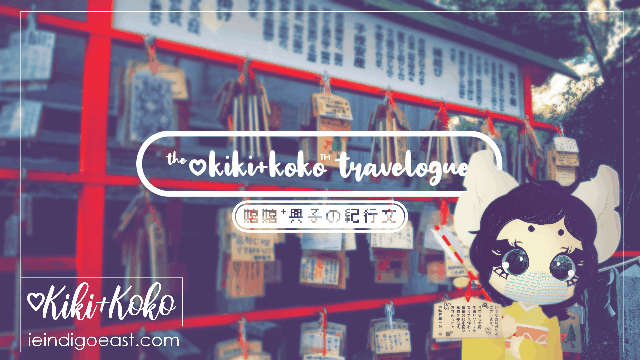 HELLO! I AM QUIZBO™!I am the resident sentient robot computer friend of Kiki+Koko: Let’s NihonGO!! Online. If you have not visited our site on a Wednesday or have not seen this segment, then this is a very auspicious day that has been bestowed upon you. If you are interested in broadening your horizons and learning new languages, then look no further. Betwixt Monday and Friday used to lay a land barren of learning. But, luckily, I was able to create this segment in order to fill the gap. This segment is meant to give an extra opportunity for learning whilst still allowing for a proper rest day. But, it is always a good idea to continue to keep your mind active, keeping new vocabulary fresh in your mind as well as introducing at least one new one. And, today, or any day that you read this, will be the perfect opportunity.
HELLO! I AM QUIZBO™!I am the resident sentient robot computer friend of Kiki+Koko: Let’s NihonGO!! Online. If you have not visited our site on a Wednesday or have not seen this segment, then this is a very auspicious day that has been bestowed upon you. If you are interested in broadening your horizons and learning new languages, then look no further. Betwixt Monday and Friday used to lay a land barren of learning. But, luckily, I was able to create this segment in order to fill the gap. This segment is meant to give an extra opportunity for learning whilst still allowing for a proper rest day. But, it is always a good idea to continue to keep your mind active, keeping new vocabulary fresh in your mind as well as introducing at least one new one. And, today, or any day that you read this, will be the perfect opportunity.
This is Word of the Week Wednesday, but you can enjoy this any day of the week. During this corner, I will present to you a word or phrase in Japanese. I will present it to you using its original Japanese format, then simplified in hiragana, and simplified further into romanised characters. However, I do not simply leave you with a definition, I also read the word aloud for you as many times as you fancy. I make sure to say it slowly, as well. It is encouraged to repeat after me, as it should assist you in learning the phrase properly.

If you would like to learn how to apply these words to your own basic sentences, feel free to take a look at a few of Kiki and Koko’s articles on this subject in Kiki+Koko: Let’s NihonGO!! Japanese Language Essentials.
After which, I will create a few example sentences for you with the help of Kiki+Koko. These sentences will help illustrate the definition and usage of the words. These also have a similarly written simplification to allow you to understand and benefit at any learning level. I will also read these sentences aloud for you! It will be at normal speed, but it is simply to assist you. Even though I am a robot, I continue to do my best.
These sentences can also assist you in creating your own sentences. But, be sure to take a look at our Japanese Language Essentials that will assist you with some of the tools you will need to create basic sentences. But, you can learn as little or as much as you like. You can use Word of the Week as a helpful study reminder or use this to delve deeper into Japanese language. Either way, we will be with you every step of the way. And, I say ‘we’ because I am joined by Kiki+Koko with their Helpful Hints segment that should hopefully add to this corner overall.
Without further ado, let us NihonGO!!
Word(s) of the Week:
注文【ちゅうもん】※
chuumon
noun, suru verb
1. order
2. request
(Polite form: ご注文【ごちゅうもん】gochuumon)
Stay tuned for Helpful Hints with Kiki+Koko after these messages!
※Helpful Hints with Kiki+Koko
Photo via @kikikokoNihonGO on Twitter
Hello, there!
We’re Kiki and Koko from Kiki+Koko: Let’s NihonGO!! This week’s Word of the Week is another versatile one that you’ll hear often if you frequent restaurants, whether fine dining or take-away. But, you’ll also see it if you order items from a Japanese language website. We’re here to give a little more context to make sure you’ll be able to recognise this very important word the next time you encounter it!
It’s always so interesting to think of how each language can have such a different way of conveying the same concept. That’s why learning a language is more of a journey than anything as there are many times where you may not know whether you can rely on previous patterns or if there’s another way that it’s done. At the same time, there are many more times that you’ll hear the exact same phraseology, so there’s no need to worry! But, there are some phrases that are markedly shorter.
Japanese language has a great way of making short and easily recognisable phrases. That being said, there are many varieties of longer phrases you’ll hear, as well. Today’s vocabulary word is no exception. We’ll focus on 注文, chuumon, which is more formally used as ご注文, gochuumon. In past segments we’ve mentioned how you can experience a lot of culture through enjoying foods, and this is definitely a phrase you’ll hear when ordering anything in a Japanese speaking establishment.
 Whether you’re sitting at a table in a dining hall or standing in front of a large menu with pictures of the latest fish, green tea, or strawberry themed fast-food item when in Japan, you may hear an employee taking your order say, ご注文は? gochuumon wa?, which is sort of the same feeling as, ‘What’ll you have?’ but is more literally, ‘As for your order?’ You would definitely benefit from our lesson covering the particle to fully absorb the usage.
Whether you’re sitting at a table in a dining hall or standing in front of a large menu with pictures of the latest fish, green tea, or strawberry themed fast-food item when in Japan, you may hear an employee taking your order say, ご注文は? gochuumon wa?, which is sort of the same feeling as, ‘What’ll you have?’ but is more literally, ‘As for your order?’ You would definitely benefit from our lesson covering the particle to fully absorb the usage.
 Now, there are MANY phrases that are used and are useful including this phrase, but this is simply a helpful hint. We’ll definitely present to you more in a future dedicated lesson. There are many set phrases and specific honorific ways of saying things that would simply be too much for this section. But, to leave this off, if you order an item online, you’ll certainly see 「注文」. When looking at an account from our great and powerful Amazon overlords with whom our lives are completely consumed, if it’s in Japanese, you’ll see 「注文」marking the ‘order’ section. And, of course, anywhere you would normally see the word ‘order,’ you’ll come across it. It’s a vital word that we’re glad QUIZBO™ chose, especially after teaching about double vowels and little ゅ. If you’re looking to learn more Japanese, you’ll need to know these concepts. We’ve linked it right here, for you~!
Now, there are MANY phrases that are used and are useful including this phrase, but this is simply a helpful hint. We’ll definitely present to you more in a future dedicated lesson. There are many set phrases and specific honorific ways of saying things that would simply be too much for this section. But, to leave this off, if you order an item online, you’ll certainly see 「注文」. When looking at an account from our great and powerful Amazon overlords with whom our lives are completely consumed, if it’s in Japanese, you’ll see 「注文」marking the ‘order’ section. And, of course, anywhere you would normally see the word ‘order,’ you’ll come across it. It’s a vital word that we’re glad QUIZBO™ chose, especially after teaching about double vowels and little ゅ. If you’re looking to learn more Japanese, you’ll need to know these concepts. We’ve linked it right here, for you~!
We hope this helps as another tool when you want to ご注文する some Japanese 食べ物 to 食べる or 飲み物 to 飲む! … Well, it’s more fun bilingually than as a coherent sentence… But have a look at those words, you may like them! You need them to survive!!
We hope that helps!! Until the next lesson!
♡Kiki+Koko
Stay Tuned for helpful example sentences!
Thank you, Kiki and Koko! This definitely gives the readers something to think about when it comes to language as well as something they can think of that they may see every day. I, for one, also welcome the rule of our Amazon overlords. Without further ado, I think that it is time to continue onto the sentence portion of the article.
Example Sentences:
The first row is in Japanese with Kanji. The Next row is in hiragana, then romanised using rōmaji with the final row translated into English.
(Japanese→Hiragana→Rōmaji→English)
Example #1:
[casual speech]
昔々、電話で 注文できて 毎月 テープカセットを送ってもらえた。
むかしむかし、 でんわで ちゅうもんできて まいげつ てーぷかせっとを おくってもらえた。
mukashi mukashi, denwa de, chuumon dekite maigetsu teepu kasetto wo okutte moraeta.
Long long ago, I could order by phone and get a cassette tape sent to me every month.
Example #2:
[‘polite’ speech]
スーパーって?昭和生まれっぽいなんて。私が オンラインで 食料品を ご注文致しますのよ。
すーぱーって? しょうわうまれっぽいなんて。 わたくしが おんらいんで しょくりょうひんを ごちゅうもん いたしますのよ。
suupaa tte? shouwa umare ppoi nante. watashi ga onrain de shokuryouhin wo gochuumon itashimasu.
The super market? How old fashioned*~ I order my groceries online.
(Lit. ‘Born in Showa era-ish’)
Example #3:
[basic polite + casual speech]
A: ご注文は お決まりですか。
A: ごちゅうもんは おきまり ですか。
A: gochuumon wa okimari desuka.
A: Have you decided on your order?
( Is your order decided? / like ‘are you ready to order?’)
B: はい、ギャルソン、最上の ラムネ 二本を お願いします。メルシー。
B: はい、ぎゃるそん、さいじょうの らむね にほんを おねがいします。 めるしー。
B: hai, gyaruson, saijou no ramune nihon wo onegai shimasu.
B: Yes, garçon, I would like two of your finest bottles of ramune. Merci.
(Note from Kiki+Koko: Oddly enough loan words from other languages are commonly known just as you may commonly know these being loaned into English conversation. Of course, this is just a fun sentence.But, Ramune is an English/Japanese mixture word that is simply its own substance of fizzy drink.)

Grooving to the content we’re creating? You can leave a TIP in the TIP♡JAR to keep it going!
(Can’t? No worries! The content is free for everyone! We’re just glad you’re here!!!)
Be sure to subscribe to our Electronic Mailing List of Tomorrow, today, using the form at the bottom of the web page so you can be the first to see the latest from Kiki+Koko: Let’s NihonGO!!, Indigo East, and SpeRaToBo. And, remember to return back to previous articles and lessons to review/revise.
Also consider following our new page on Twitter to support the spread of this site in a friendly domination of Earth that will help more people. Or, if you are enjoying the content that we are creating, or want to spread this content to more people to be able to access it for free, you can leave a TIP in the TIP♡JAR to keep it going. If you cannot, then no need to worry. We are just super happy that you are here! It is appreciated!
Thank you so much for learning with us!
♡QUIZBO™



































